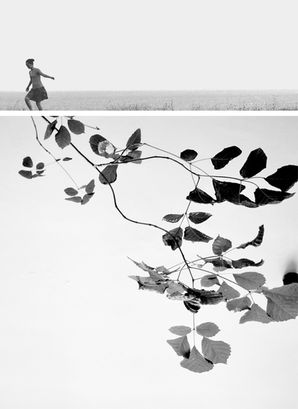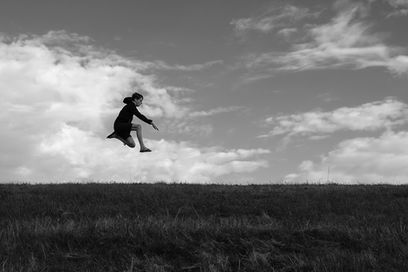
LIVED SPACES
March 22, 2021
INTERVIEW
PHOTOGRAPHY Ryan Dodd
INTERVIEW Melanie Meggs
Every day, all around the world, billions of people are living their lives without us ever noticing. Photographer Ryan Dodd has set out to capture these overlooked moments and to tell the stories of the unseen inhabitants in a series of photographs. Unlike many photographers, Ryan chooses not to impose his presence but instead allows the moment to unfold in front of him naturally. His photos aim to make us ask questions: what happens on these streets? What happens inside these homes? Through his thoughtful observations, Ryan focuses on the small details that are so often overlooked in our everyday lives. Capturing these fleeting moments, he hopes to bring attention to the people living within these ‘lived’ spaces, allowing the audience to discover something new and to appreciate the beauty in the ordinary. Join us as we explore the captivating work of Ryan Dodd and his ongoing project about 'lived' spaces.

“I am interested in the urban places where most people live. I find that there is a kind of energy to those areas that draws me in. In England, these city spaces can look similar, but I find there’s a lot to observe if you take your time. Right now I’m finding plenty to interest me locally.”
IN CONVERSATION WITH RYAN DODD
THE PICTORIAL LIST: Ryan please tell us about yourself. How did you become interested in photography?
RYAN DODD: I was born in the South of England, where I still live. Photography wasn’t the first medium I engaged with creatively, I actually have a background as a graphic artist. Nearly ten years ago I had a graphic novel published. At some point I found that drawing was too slow and could no longer do what I wanted. So I pretty much quit doing that. I picked up a camera one day and decided why not, what could there be to lose in trying it? I liked the way it felt to take photographs so I’ve continued it ever since. I still do sketches sometimes but it’s extremely sporadic.
TPL: Where do you find your inspiration?
RD: I draw my inspiration from what I discover out in the field.
TPL: What is it that you enjoy about 'banal' photography? What happens when you walk the streets with your camera? Explain your technique? Have you ever had a negative encounter?
RD: I take inspiration from the spaces and objects I encounter when I am out taking photographs. Essentially I spot something that I want to investigate further with the camera. If the area is busy I’ll walk around the block until it isn’t. Sometimes the area is fenced off and I have to find some way to get creative about getting the photograph. Or I’ll come back and explore the same area taking a slightly different route. Quietly observing and waiting for something to reveal itself to me is at the heart of my process.
I can recall a somewhat funny negative encounter. I was photographing an aerial on top of the roof of a house. I thought the way the wispy clouds in the sky framed this object was kind of interesting. Anyway, the owner of the house didn’t take kindly to me standing there taking photographs, and opened a window up ready to shout at me. I explained that I was an artist and that I was just capturing the thing on their roof against the sky, and they actually seemed quite pleased after that.
TPL: When you go out photographing, do you have a concept in mind of what you want to shoot, or do you let the images just 'come to you', or is it both?
RD: I sometimes go out with a plan, having thought about some aspect of a photograph I have taken or seen, or some idea that I want to be able to convey using the medium. But once I’m out in the field, no matter what my plan was, something else always presents itself to me and I have to go with it.
TPL: Do you have a favourite quote, lyric or saying that especially resonates with you?
RD: I’ve been a fan of Slavoj Žižek for a while. Admittedly some of his writing is borderline impenetrable. But unlike a lot of academics of his standing he has a very cheeky sense of humour which makes him much more relatable and entertaining to listen too. I’ve liked the notion that ideology guides or constrains so much of our thinking and Žižek has a pretty humorous allegory for this.
“I already am eating from the trash can all the time. The name of this trash can is ideology. The material force of ideology makes me not see what I am effectively eating.” - Slavoj Žižek
Žižek mentions this in an analysis of John Carpenter’s ‘They Live’, which just so happens to be one of my favourite movie directors and films from my teen years. It’s in this same piece of analysis that Žižek talks about “pure ideology”. Which is probably what he is most known for in terms of internet memes.
I like the idea that something can be revealed through a photograph that otherwise you wouldn’t have thought of or even noticed. Where possible I like to incorporate chance and the accidental into my work.

TPL: What has been the best advice you have ever received in photography?
RD: I went to meet with a mentor at the Aspex Gallery to discuss my work. It was suggested to me that I take a look at William Eggleston and Martin Parr’s photography. I had come across their work before but had never owned any of their books. I started to seriously invest in photography books after that. I had studied for a Bachelor degree in Web Science at the University of Southampton before, and it was suggested in this same meeting that I go on to pursue a Master’s degree in Photography. That is what I’m currently studying.
TPL: Does the equipment you use help you in achieving your vision in your photography? What camera do you use? Do you have a preferred lens/focal length?
RD: My approach relies on the technological limits of the camera not restricting my ability to respond spontaneously. So the camera will inevitably get in the way at times, and of course light conditions are always a factor.
I have used a rather outdated Pentax K-x DSLR that I find can add in some rather interesting grain and grittiness to some photographs. But I’ve also had the chance to use a Nikon D3400, a Fujifilm XF100, and a Canon EOS 5DS. An 18-55mm, or 24-70mm lens has been my favourite for the ability to quickly switch between different compositional possibilities. There is also something to be said to restricting yourself by using a fixed 23mm lens as was the case with the Fujifilm I used.
TPL: Do you have any favourite artists or photographers you would like to share with us, and the reason for their significance?
RD: Eggleston’s work helped give a feeling that what I was doing in photographing mundane, everyday scenes had some purpose behind it, even If I couldn’t understand what exactly that was. I look outside of photography as well, some of my favourite artists are Emil Nolde, Pieter Bruegel, Maurice Utrillo, and Tom Roberts.
TPL: Are there any special projects you are currently working on that you would like to let everyone know about? What are some of your goals as an artist? Where do you see yourself or hope to see yourself in five years?
RD: I’m right in the middle of putting together a body of work in the banal genre, building it, refining it. I’m hoping to find the right space for it once it’s finished but there is still a little way to go. And eventually putting together a photography book of my own. When it comes to the specifics of how to reach these goals, I don’t tend to think as far into the future as five years. I feel it’s a distraction to think beyond exactly what I’m trying to do right now.
TPL: When I am not out photographing, I (like to)…
RD: I’m constantly thinking about ideas. I’ve had the opportunity to engage with some of these ideas in my Master’s degree. I also enjoy walking and daydreaming. In my down time I enjoy watching slightly outdated cheesy TV dramas like ‘Lost Girl’.

Ryan Dodd’s work is a reminder that there is beauty to be found in our everyday lives - even in the moments that we often overlook. Through his thoughtfully composed photographs, he brings attention to the spaces in which people live. We are invited to explore this captivating project and to draw our own conclusions about the ‘lived’ space and its inhabitants. By joining Ryan on this journey, we can gain a newfound appreciation for the importance of the seemingly mundane moments in life. Take a moment to explore this project and to discover something new.


































